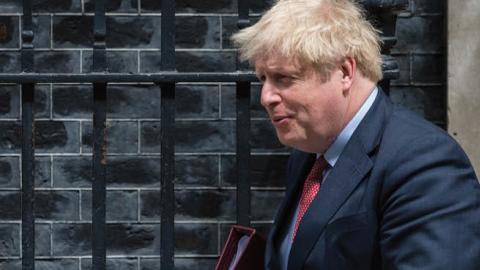Over the past few weeks, British Prime Minister Boris Johnson has made a series of surprising foreign policy decisions. His government has stood up to Xi Jinping over Hong Kong, impressing officials in Washington and surprising them in Brussels. It has imposed personal sanctions on Russian and Saudi officials and worked hard to put the Five Eyes intelligence alliance of Anglophone countries at the heart of an effort to contain China. Behind the scenes, British diplomats have also been promoting an initiative to create a new forum of the world’s leading democracies, the D-10, designed to push back against growing authoritarianism.
By making these moves, Johnson hasn’t just struck a contrast with European leaders such as Angela Merkel, who puts economic ties with China first, or Emmanuel Macron, who has set up “ working groups ” with Russia. He has also dashed the hopes of many of London’s original supporters of Brexit in finance, who had hoped that a post-European Britain would embrace free trade over all else. Though they didn’t always say so openly, many of the original Brexiteers cared far more about ultra-low taxes, welcoming oligarchs and building new trade agreements with Asia than defending human rights or pushing back against dictators.
Revealingly, some Brexit zealots picked as their lodestar an authoritarian Asian island nation that combines freewheeling capitalism with a marked lack of interest in democracy. “The Singapore model is our Brexit opportunity,” as one of Parliament’s most ardent Brexiteers, Owen Paterson, put it. Dominic Raab, the foreign secretary, evoked Elizabethan privateers when he called for Britain to embrace “a buccaneering approach to global free trade.” Note: Pirates care about loot, not other people’s freedoms.
Now Britain is back, but not as Singapore-on-Thames. Instead, Johnson seems to be emulating Margaret Thatcher or Tony Blair, both of whom punched against authoritarianism while sticking close to the United States — with the United Kingdom as the “ pocket superpower. ” Johnson’s stunning offer to extend unlimited residency rights and even a pathway to citizenship to almost 3 million Hong Kongers has incensed Beijing, erasing any hope of a buccaneering free-trade deal with China. Imminent plans to drop Huawei from the British 5G network are set to raise the stakes even further. The Chinese ambassador in London is now saying Britain is treating China as potentially “ a hostile partner. ”
What David Cameron and George Osborne hopefully called “the golden era” of trade with China is over. A new wave of personal sanctions is triggering a shutdown of targeted accounts across British Caribbean tax havens such as the Cayman Islands, signaling the end of the “golden era” of kleptocrats treating London and its banks as their playground. The Brexiteers’ tune has changed significantly.
But what changed? The answer is that both London hedge funders and the Tory party’s genuine buccaneers have lost the battle to define Global Britain after Brexit. Tom Tugendhat, chairman of Parliament’s foreign affairs committee, told me this merely concedes an ill-concealed reality: “Brexit has always been more about identity and working out who we really are in the 21st century than buccaneering free trade.”
And it turns out the identity the Conservative Party really wants for Britain in the world is much closer to the old 20th-century one and not some radical new departure after all. Johnson’s foreign policy has revealed that the libertarian free traders and London financiers no longer have much say on the future of Brexit. That wasn’t the independent Britain the Brexiteers wanted.
Now the libertarian free traders have been defeated by revolts inside the Conservative Party: The party’s parliamentary back-benchers have mobilized to kick Huawei out of the United Kingdom’s 5G network and are now threatening to reject a potential free trade with the United States. In both cases, Johnson’s policies now reflect his voters, not his party donors or ideologues: 57 percent of Britons view China as a threat to world peace, and about 80 percent say they would not accept lower standards as part of a trade deal with the United States.
Brexiteers talk of dropping all tariffs to zero has disappeared. Johnson’s Global Britain is turning out to be more protectionist, hard-nosed, even moral, than the Brexit that was expected when it erupted out of the gauzy sheen of the Cameron-Osborne era. This shouldn’t surprise us. Not only in Britain but across the West the influence of bankers and China-huggers has collapsed. The novel coronavirus has radicalized trends that were already happening on both sides of the Atlantic: a return of the state, a revival of tariffs and a rebalancing of the relationship with China.
Reversing this trend will be hard. Johnson’s government has just announced further plans to counter the pandemic with borrowing set to hit about $450 billion this year. Now even most Conservatives believe an ultra-low-tax economy is off the table for at least a generation. That leaves the new Britain — with its big state at home and staunchly Atlanticist foreign policy — looking a lot like the old one.
Read in The Washington Post















